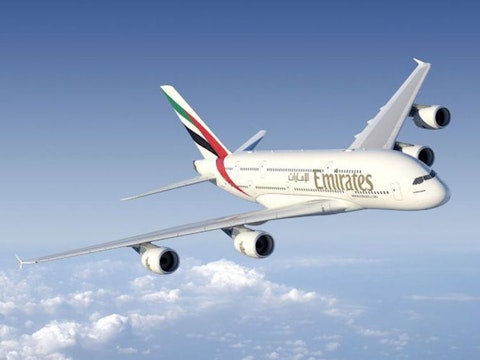In this article, we will be taking a look at the 15 most luxurious airlines in the world. To skip our detailed analysis of the global airline industry, you can go directly to 5 Most Luxurious Airlines in the World.
Airline Industry Profitability Outlook
The airline industry is once again in full swing following the opening of the hospitality and travel industry. On June 5, the International Air Transport Association (IATA) upgraded its profitability outlook of the airline industry for 2023. The airline industry is witnessing high travel demand post-COVID and that is pushing the profitability outlook for the industry.
Before we talk about the profitability forecast of the airline industry, let’s briefly take a look at the airline industry’s profit margins. As we pointed out earlier, the airline industry has some of the lowest profit margins. This is one of the main reasons why the airline industry is unable to adjust to economic crises or downward pricing pressure, as experienced throughout the COVID-19 pandemic. Between 2020 and 2022, the airline industry potentially lost around $200 billion, even the best airlines in the world had job cuts at a massive scale.
Even though the airline industry had severe economic impacts during the pandemic, we are noticing a remarkable recovery in 2023. As per IATA, the total revenue is expected to grow to $803 billion in 2023, up by 9.7% year over year. The airline industry revenue will cross the $800 billion mark for the first time since 2019, which was reported at $838 billion. IATA has upgraded its profitability outlook for the airline industry to a net profit of $9.8 billion in 2023 from $4.7 billion, as per the projection in December 2022. The good thing about the industry outlook is that expense growth is expected to remain consistent with an annual increase of 8.1%. IATA’s Director General, Willie Walsh, regarding the airline industry outlook mentioned:
“Airline financial performance in 2023 is beating expectations. Stronger profitability is supported by several positive developments. China lifted COVID-19 restrictions earlier in the year than anticipated. Cargo revenues remain above pre-pandemic levels even though volumes have not. And, on the cost side, there is some relief. Jet fuel prices, although still high, have moderated over the first half of the year.
Economic uncertainties have not dampened the desire to travel, even as ticket prices absorbed elevated fuel costs. After deep COVID-19 losses, even a net profit margin of 1.2% is something to celebrate! But with airlines just making $2.25 per passenger on average, repairing damaged balance sheets and providing investors with sustainable returns on their capital will continue to be a challenge for many airlines.”
The hospitality and leisure industry is reviving as the world’s urge to travel continues to increase. As per IATA, the estimated number of travelers is expected to be around 4.35 billion in 2023. The traveling demand is expected to drive an average passenger load factor of 80.9% in 2023, reaching closer to 2019’s record performance of 82.6%.
Some of the busiest airline regions including North America, Europe, Asia Pacific, and the Middle East, should continue to maintain the rising trend in the market. North America leads the way with an expected net profit of around $11.5 billion in 2023. At the same time, Europe and the Middle East should make a net profit of $5.1 billion and $2 billion, respectively.
Airline Industry’s New Initiatives
To keep up with the luxury, airline companies always try to offer top-end services in the form of business and first class flights. However, just like any other industry, airline companies need to find a way to make flights eco-friendly. On June 29, the World Economic Forum shared a report which mentions the pre-pandemic carbon emissions from the aviation industry were around 2.5% of global total emissions. The airline industry expects to achieve net-zero flying by 2050. In that premise, Europe is aiming to modernize air traffic control systems to decrease up to 10% of emissions. At the same time, the U.S. is working on a similar programme called NextGen17. As of April 2023, 25 airlines, mostly from the Americas and Europe, have initiated science-based targets to reduce CO2 emissions, according to an analysis by McKinsey. The airlines from the Americas and Europe reflect more than 30% of global passenger traffic. Many airlines around the world have committed to sustainability goals such as carbon reduction and SAF targets. The stakeholders in the aviation industry are working on defined paths to minimize emissions including the Paris Agreement and the Science Based Targets initiative (SBTi). Some of the most efficient practices to reduce CO2 emissions is to optimize air space usage. However, the airlines need to make policies for these new initiatives based on their cost and production. The current economic state makes it difficult for airline companies to adapt to regional incentives and penalties. For instance, Europe’s response to the Inflation Reduction Act could influence SAF-related decarbonization costs for the airlines operating in Europe.
The President of United Airlines Venture, owned by United Airlines Holdings Inc. (NASDAQ:UAL), Michael Leskinen has been vocal about the decarbonization of aviation. On June 19, during the Paris Air Show, Michael while talking to Bloomberg highlighted that United Airlines Holdings Inc. (NASDAQ:UAL) is working on sustainable fuel production and limiting the green premium. Leskinen predicts the airline industry will convert to hydrogen over the next 20-30 years. In the first quarter 2023 earnings call, United Airlines Holdings Inc. (NASDAQ:UAL) addressed the macroeconomic challenges and what the company has done to achieve its operational targets. The company’s Q1 2023 comments mention:
“We can’t control what happens with the macro economy, but we can and are doing a great job of controlling our cost. We can’t run your airline like it’s 2019, it’s different and harder now. Cancellation rates are the leading indicator of forward capacity and therefore CASM-ex and United is leading the way on this front. Gerry will discuss some of the year-over-year tailwinds that will drive lower CASM-ex in the back half of this year, but we only need CASM-ex to be approximately 1 point better in the second half of the year to hit our full year target. We remain solidly on track. To wrap up, over the last 3 years, our industry has confronted a rapidly changing environment. United hasn’t been perfect, but we have got a lot more right than normal.
In the big picture, we have got it right and took the steps in the last 3 years to thrive in exactly this environment. International is stronger, the operating environment is more challenging, which means reliability is harder, but also had a premium for producing bottom line results and we had confidence that our gauge growth and execution are keeping United uniquely on track for our near and long-term CASM-ex trajectory, that not to say that there aren’t real near-term risk, because we all know there are, but we feel really good about the strategic setup and tactical execution here at United. I want to again thank the entire United team for their hard work this quarter.
We continue to see the benefits of running a strong operation. In the first quarter, United led the industry with the lowest seat cancellation rate despite around 20% of our flights being impacted by weather, the most out of any of our competitors. This was the first time since 2012 that we led on this metric. Additionally, United was first or second in the quarter for on-time departures at nearly all of our hub locations, including those heavily impacted by winter weather like O’Hare and Denver. Our airline is built to run well and recover fast and we expect our operation to reflect that in the peak summer season. We continue to navigate the challenges in the current operating environment. Specifically, constrained industry infrastructure, United is working with the U.S. Department of Transportation and FAA regarding operational disruptions and air traffic staffing challenges.”
Some of the best airline stocks to buy according to the hedge funds include United Airlines Holdings Inc. (NASDAQ:UAL), American Airlines Group Inc. (NASDAQ:AAL), and Delta Air Lines, Inc. (NYSE:DLA).

Our Methodology
For this article, we took the data from two of the most credible sources that give ratings to airlines, Skytrax and Airline Ratings. We took the latest list of the best airlines for 2023 and shortlisted the top 15 airlines from both sources. To measure the luxury, we checked the available first class flights from various airports. The first class category is the top-end flight service offered by an airline. The flights were one-way and the prices of each flight were changed to U.S. dollars, as of July 19. The first class flight with the highest price was ranked higher, and so on. Since this is a highly subjective topic, it was not easy to choose flights from any specific airport, as the availability of first class flights and the routes varied. Our methodology to capture the 15 most luxurious airlines in the world isn’t perfect but a reasonable approximation. For certain flights, the distance varied from the airport. For instance, an airline from the Middle East might charge higher for a flight to Australia rather than Europe, depending on its flight routes. This means our methodology can be biased against airlines operating in different regions. The 15 most luxurious airlines in the world are listed in ascending order of the aforementioned metric.
Considering luxury, airlines offer various amenities for their first class flights such as early check-ins, private lounges at the airport, and private rooms on flights. In addition, upscale food is served which can include champagne and other fancy delights.
15 Most Luxurious Airlines in the World
15. Air New Zealand
Price per First Class Ticket: $3,862
Air New Zealand is the national airline of New Zealand, as the government owns 51% of the shares. The airline offers a variety of top-end services during its first class flight such as a free standard seat select option, leather armchair with personal space, inflight entertainment, and three luggage bags up to 23kg each. Air New Zealand is ranked 15th on our list of the most luxurious airlines in the world.
Some of the best airline companies operating around the world include United Airlines Holdings Inc. (NASDAQ:UAL), American Airlines Group Inc. (NASDAQ:AAL), and Delta Air Lines, Inc. (NYSE:DLA).
14. EVA Air
Price per First Class Ticket: $4,134
EVA Air is a privately owned airline and a sister company of shipping and transportation firm Evergreen Marine Corporation Ltd. (2603.TW). EVA Air via its first class flight offers comfortable personal spaces for travelers with its Royal Laurel Class seats. Along with other top-notch amenities, EVA Air ranks among the most luxurious airlines in the world.
13. Virgin Australia
Price per First Class Ticket: $4,403
Virgin Australia is one of the largest airlines in Australia. The airline’s top-end flights offer luxurious and unique premium cabins for international travelers. Virgin Australia is ranked 13th on our list of the most luxurious airlines in the world.
12. Korean Air
Price per First Class Ticket: $5,158
Korean Air is South Korea’s largest airline and ranks among the most luxurious airlines in the world. Korean Air provides some of the most comfortable flights via first class. The airline allows travelers to choose meals at their preferred time. In addition, the airline also offers premium amenity kits including a skincare set from French luxury brand Atelier Cologne.
11. Etihad Airways
Price per First Class Ticket: $6,811
The Abu Bhai-based airline is one of the largest airlines in the world. Etihad Airways offers a Chauffeur who drives the traveler to the airport in luxury. The travelers can then relax and dine in the airline’s First Lounge. On top of that, the flight is a top-level experience considering a luxurious journey. Etihad Airways is ranked 11th on our list of the most luxurious airlines in the world.
10. Swiss International Air Lines
Price per First Class Ticket: $6,831
Swiss International Air Lines is Switzerland’s flag carrier with its operations in over 40 countries. Travelers can enjoy a comfortable and peaceful journey through the airline’s first class flight along with a pre-flight dinner. Swiss International Air Lines is one of the most luxurious airlines in the world.
9. Qantas
Price per First Class Ticket: $8,470
Qantas is Australia’s top brand that has helped the country’s international aviation industry. The airline’s first class ticket brings you various lavish services which include stylish lounges, spa treatment before take-off, and a spacious suite. Qantas is ranked ninth on our list of the most luxurious airlines in the world.
8. Cathay Pacific Airways
Price per First Class Ticket: $8,866
Cathay Pacific Airways is Hong Kong’s leading airline. The airline offers some of the finest sleepers with soft beds. In addition, Cathay offers its award-winning champagne cuveés, Betsy beer, and prestigious vintages. Cathay Pacific Airways is one of the most luxurious airlines in the world.
7. Singapore Airlines
Price per First Class Ticket: $9,133
One of the most renowned international airlines, Singapore Airlines gives you a lavish experience via its first class flight. Travelers can reserve the main course up to 24 hours before their flight. The airline’s food includes recipes from notable chefs from its International Culinary Panel. With top-notch services all around, Singapore Airlines ranks among the most luxurious airlines in the world.
6. Qatar Airways
Price per First Class Ticket: $10,701
Qatar Airways is owned by the Qatari government and was ranked the number 1 airline in 2022 by Skytrax. The airline provides one of the best first class services in the world with its spacious suites including stowage options and comfortable lie-flat beds. The airline’s award-winning cabin crew looks after travelers in the best way possible. Qatar Airways is ranked sixth on our list of the most luxurious airlines in the world.
Some of the most best-in-class airlines are owned and operated by United Airlines Holdings Inc. (NASDAQ:UAL), American Airlines Group Inc. (NASDAQ:AAL), and Delta Air Lines, Inc. (NYSE:DLA).
Click to continue reading and see 5 Most Luxurious Airlines in the World.
Suggested articles:
- 10 Best Artificial Intelligence Stocks Under $10
- 30 Countries with the Oldest People in the World
- Top 10 AI Tools Cooler Than ChatGPT
Disclosure: None. 15 Most Luxurious Airlines in the World is originally published on Insider Monkey.



